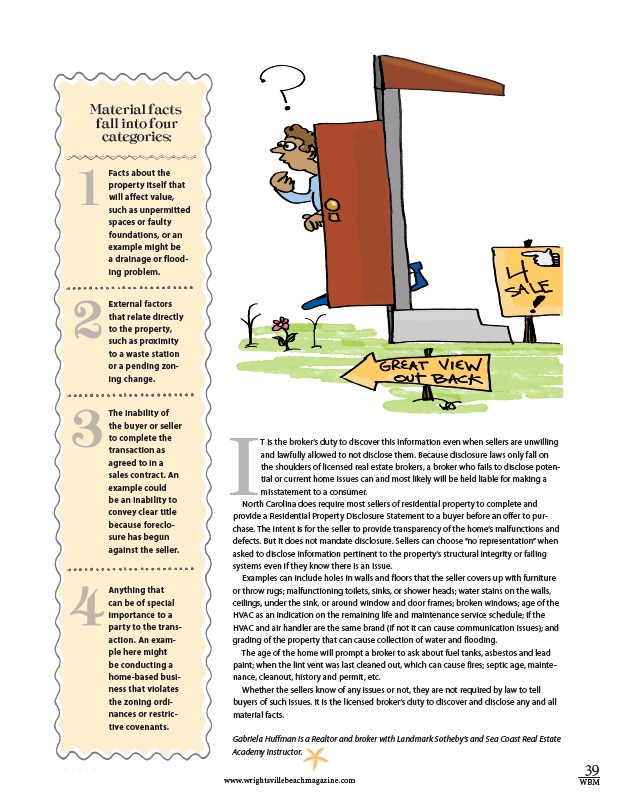
I
www.wrightsvillebeachmagazine.com 39
WBM
Material facts
fall into four
categories:
Facts about the
property itself that
will affect value,
such as unpermitted
spaces or faulty
foundations, or an
example might be
a drainage or flood-ing
problem.
The inability of
the buyer or seller
to complete the
transaction as
agreed to in a
sales contract. An
example could
be an inability to
convey clear title
because foreclo-sure
has begun
against the seller.
Anything that
can be of special
importance to a
party to the trans-action.
An exam-ple
here might
be conducting a
home-based busi-ness
that violates
the zoning ordi-nances
or restric-tive
covenants.
1
2
4
External factors
that relate directly
to the property,
such as proximity
to a waste station
or a pending zon-ing
change.
3
T is the broker’s duty to discover this information even when sellers are unwilling
and lawfully allowed to not disclose them. Because disclosure laws only fall on
the shoulders of licensed real estate brokers, a broker who fails to disclose poten-tial
or current home issues can and most likely will be held liable for making a
misstatement to a consumer.
North Carolina does require most sellers of residential property to complete and
provide a Residential Property Disclosure Statement to a buyer before an offer to pur-chase.
The intent is for the seller to provide transparency of the home’s malfunctions and
defects. But it does not mandate disclosure. Sellers can choose “no representation” when
asked to disclose information pertinent to the property’s structural integrity or failing
systems even if they know there is an issue.
Examples can include holes in walls and floors that the seller covers up with furniture
or throw rugs; malfunctioning toilets, sinks, or shower heads; water stains on the walls,
ceilings, under the sink, or around window and door frames; broken windows; age of the
HVAC as an indication on the remaining life and maintenance service schedule; if the
HVAC and air handler are the same brand (if not it can cause communication issues); and
grading of the property that can cause collection of water and flooding.
The age of the home will prompt a broker to ask about fuel tanks, asbestos and lead
paint; when the lint vent was last cleaned out, which can cause fires; septic age, mainte-nance,
cleanout, history and permit, etc.
Whether the sellers know of any issues or not, they are not required by law to tell
buyers of such issues. It is the licensed broker’s duty to discover and disclose any and all
material facts.
Gabriela Huffman is a Realtor and broker with Landmark Sotheby’s and Sea Coast Real Estate
Academy Instructor.